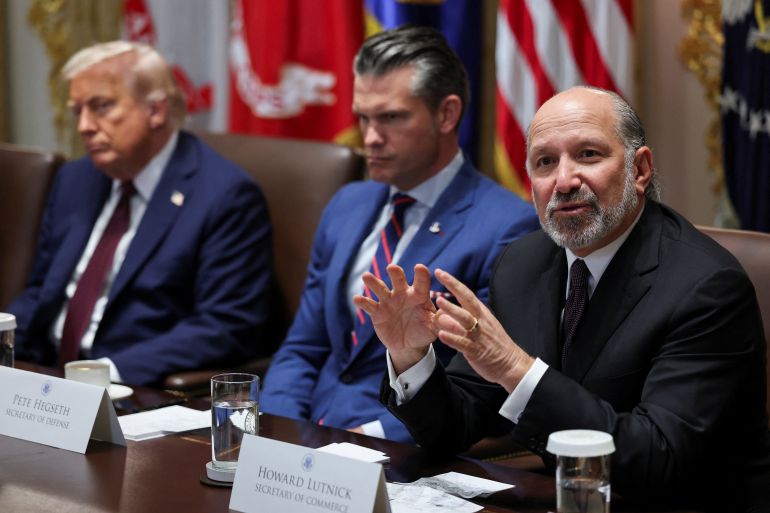Trump administration considers stake in defence firms like Lockheed Martin
US Commerce Secretary Howard Lutnick floated the possible investment in a TV appearance, as part of a wider Trump push.

Published On 26 Aug 202526 Aug 2025
The administration of United States President Donald Trump is considering taking a stake in domestic defence contractors, including the aerospace company Lockheed Martin.
On Tuesday, Secretary of Commerce Howard Lutnick hinted at the administration making a possible investment in the company as he defended Trump’s push for a greater role in business.
Recommended Stories
list of 3 itemsend of list
“They’re thinking about it,” Lutnick told the news outlet CNBC when asked if the administration was considering taking pieces of contractors such as Lockheed Martin, Boeing or Palantir Technologies.
While Lutnick cited Pentagon leaders as the source of his information, he also indicated that deals were far from being finalised.
“There’s a lot of talking that needs to be had about, how do we finance our munitions acquisitions?” Lutnick said.
Still, he argued that some private businesses were extensions of the US government. “There’s a monstrous discussion about defence,” he explained. “Lockheed Martin makes 97 percent of their revenue from the US government. They are basically an arm of the US government.”
Lutnick’s statements come on the heels of the Trump administration announcing last week that it had taken a 10 percent stake in the struggling semiconductor chip giant Intel.
Since taking office for a second term, Trump has sought to increase US investments in several key industries, from steel to technology, prompting questions about whether Republicans were drifting from the “small government” platform they are often associated with.
Advertisement
Lockheed Martin, whose shares rose 1.6 percent following the remarks, responded to Lutnick’s comments by saying, “We are continuing our strong working relationship with President Trump and his Administration to strengthen our national defense.”
Boeing declined to comment, while Palantir did not respond to a request for comment. Boeing’s stock was up 2.8 percent. Meanwhile, Palantir reversed a small initial slide of about 1 percent following the remarks, and by midday, was trading up at 1.4 percent.
Lutnick’s comments are the latest example of the White House’s aggressive interventions in the private sector.
Such moves have historically only been undertaken in wartime, or to save struggling and strategic domestic companies during times of economic stress.
William Hartung, a senior research fellow at the Quincy Institute for Responsible Statecraft, a think tank, described the move as a bad idea.
He explained that it might “incentivise the government to put financial success for Lockheed Martin ahead of more important strategic considerations”.
“We need some healthy distance between the government and the companies it is supposed to regulate,” he added.
A growing government stake in private enterprise
But despite rumblings from critics, the Trump administration has forged forward with collecting stakes in various industries.
On Friday, it announced that Intel had sold the government a 10 percent stake in its chip-manufacturing business. And in June, the Trump administration intervened to complete Nippon Steel’s purchase of US Steel, taking what Trump called a “golden share” that gives Washington sway over its operations.
It also acquired a stake in MP Materials, a rare earths company, and brokered a deal with technology companies Nvidia and AMD to take 15 percent of their revenue from sales of chips to China that had previously been prohibited.
On Monday, Trump said he wanted to make more US government investments in healthy US companies, even as critics warn that such a role for the government could limit corporate strategy and market agility. Critics have also raised questions about the impact on consumers.
The unusual level of federal government intervention in the economy has created unexpected alliances. Left-leaning Senator Bernie Sanders of Vermont, for example, backed the stake in Intel.
“If microchip companies make a profit from the generous grants they receive from the federal government, the taxpayers of America have a right to a reasonable return on that investment,” Sanders told the news agency Reuters last week.
Advertisement
Lutnick on Tuesday said that companies that need federal assistance should be prepared to deal with Trump.
“If a company comes to the United States of America government and says, ‘We need your help, we want to change everything’… I think that’s a question between the CEO and the president of the United States of whether he will listen to them and change the rules,” he told CNBC, citing the Nvidia deal.
“If we are adding fundamental value to your business, I think it’s fair for Donald Trump to think about the American people.”
